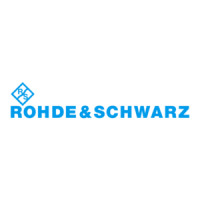Reference Oscillator
R&S
®
SMA100B
269User Manual 1178.3834.02 ─ 05
●
Clean external reference source with quality exceeding the quality of the built-in
reference oscillator
(see "Using external reference source" on page 270)
●
Interfered or noisy external reference signal
(see "Deriving 10 MHz from the external reference frequency" on page 271)
●
1 GHz reference coupling for phase coherence of the RF signals with reasonable
long-term phase stability
(see "Sharing the 1 GHz reference frequency to obtain phase-coherent signals"
on page 270)
Connectors overview
Use the "Show Connector" function to indicate the connector on the front/real panel:
●
Ref In/Ref Out
●
Ref In/Ref Out 1GHz
●
"EFC" on page 42
Distributing the internal 10 MHz reference signal to further instruments
The internal reference oscillator provides the reference frequency:
●
Internal f
ref
= 10 MHz (10 MHz at connector Ref Out)
●
Source = "Internal"
●
Reference Output/1GHz Reference Output = "10 MHz"
●
Optional:
– External Tuning Active = "On"
– External Tuning Slope = "Low"
Figure 8-1: Synchronizing instruments using the internal 10 MHz reference signal of the
R&S
SMA100B
EFC = External frequency control
EFC,Ref In,Ref Out = Connectors
In phase noise measurement systems, for example, you can also use the EFC (exter-
nal frequency control) function and shift the frequency. EFC is a function that trans-
forms an external tuning voltage into frequency shift, where the value range of the
resulting frequency is a technical characteristic listed in the data sheet. See the data
sheet also for information on the sensitivity, input voltage range, impedance and maxi-
mum bandwidth for external tuning signal.
Consider the following interdependency:
●
EFC in combination with an external PLL
Using the Reference Frequency for Instruments Synchronization

